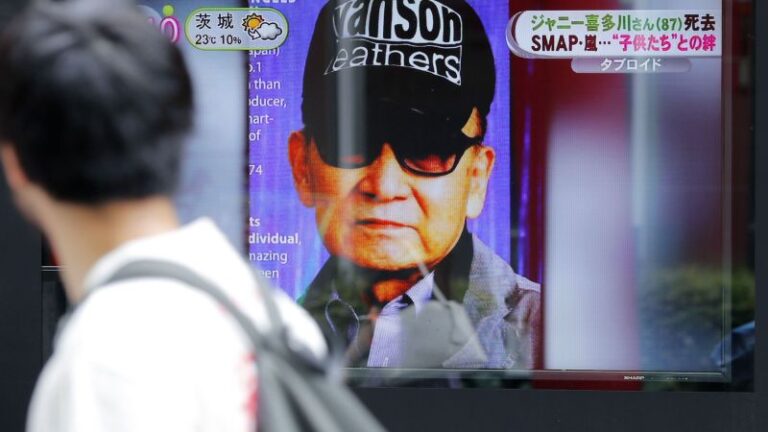Hong Kong
CNN
—
A former J-pop star trainee came forward with allegations Wednesday that he and multiple other young men were sexually abused by the late Johnny Kitagawa, once a powerful figure in Japan’s entertainment industry.
Japanese-Brazilian singer-songwriter Kauan Okamoto alleged during a press conference that over the course of four years, beginning in 2012 when he was 15, he was repeatedly sexually assaulted by Kitagawa, who died age 87 in 2019.
Okamoto said the abuse happened when he would stay overnight at one of Kitagawa’s penthouse apartments in Tokyo, often with other young aspiring musicians who were also signed to Kitagawa’s talent agency, Johnny & Associates.
Okamoto made the allegations during a press conference at the Foreign Correspondents’ Club of Japan Wednesday, saying he was speaking out now in the hope that other alleged victims will come forward.
During his long career, Kitagawa headed Japan’s biggest talent agency and was known for manufacturing popular boy-bands and launching the music and acting careers of teen idols. He was a powerful and influential figure in the media and entertainment industries for decades.
Johnny & Associates released a statement to Japanese public broadcaster NHK in response to the allegations. CNN has also reached out to the company for comment.
“Since the change in management following the death of the former president in 2019, we have developed a trustworthy, highly transparent organizational structure and systems that is in line with the times,” the statement said.
“The entire company will continue to work together to ensure thorough compliance without exception by management and employees, and strengthen the governance system with the cooperation of neutral experts,” it continued, without directly addressing the allegations.
There have been long-standing allegations against Kitagawa. In 1999, Japanese magazine Shukan Bunshun published accounts of other young men and boys who claimed they were sexually abused by Kitagawa. He sued the magazine for libel and was awarded damages, according to local media. A Tokyo High Court partially overturned the earlier decision in 2003, ruling the published sexual abuse claims were not libelous. An appeal brought by Kitagawa was later dismissed by the Supreme Court in 2005.
Kitagawa was never charged over the allegations. He had reportedly denied all accusations when he was alive.
Singer-songwriter Okamoto joined Kitagawa’s agency in February 2012 while he was in junior high school. He became a member of Johnny’s Juniors, a J-pop trainee talent pool set up by Kitagawa for young hopefuls trying to make it in the industry.
Okamoto said Kitagawa would often invite these young recruits to spend the night in his apartment, and pick “favorites” among the boys. He told reporters that when Kitagawa told him “you should go to bed early,” the other Juniors “knew that it was my turn.”
He claims the first time Kitagawa sexually assaulted him was in March 2012. That day work had finished late and he stayed at Kitagawa’s place with other Juniors.
Okamoto said he had heard from other boys that Kitagawa would be “in a very bad mood the next day if you didn’t go to sleep in his room or a room nearby.”
He describes hearing Kitagawa’s slippers approaching his room, pulling off the futon he was sleeping under and lying down next to him.
“He began massaging my feet,” Okamoto said, and alleged that Kitagawa touched his genitals and performed oral sex on him.
Okamoto said the following day Kitagawa gave him 10,000 yen (about US$75) without giving a reason.
By the time Okamoto left Johnny & Associates in 2016, he alleged that he had been assaulted between 15 and 20 times by Kitagawa.
He said he saw between 100 and 200 Juniors rotating in and out of the apartment during the four years he was with the agency, and alleged the majority of them were similarly assaulted by Kitagawa.
“There were things I saw. In some instances it happened right next to me because we were sleeping in the same room. I would say three other members for sure, but to be honest I think that almost everyone fell victim to him because as long as we stayed at his place it would be very rare that someone would be unscathed,” he said, adding that he believes “the majority of the 100 to 200 during my time experienced that.”
For a long time, Okamoto said he couldn’t talk about his experiences.
“There are others… who have decided to stay anonymous. I chose to show my face. But that might change as well. That is the hope that I have,” he said.
Okamoto also alleged that if a boy refused Kitagawa’s advances, their career would be over.
While Kitagawa “would never directly or explicitly mention that if you don’t do so and so, you won’t be a success,” Okamoto said, his favorites would be picked for their debuts as entertainers and receive more opportunities.
“It was a special situation in that someone who would be standing next to Johnny-san would be picked to, for example, act in a TV program or be allowed to form a boyband.”
He said it was “general awareness among everyone” that “you have to be at his place to succeed, so you have to even take the initiative to be at his place.”
Okamoto said he was frustrated that long-standing allegations against Kitagawa had not been taken seriously.
Okamoto said because of Kitagawa, “my life did turn around” but “I also believe what Johnny-san did to me…and to the other Juniors was a bad thing.”



